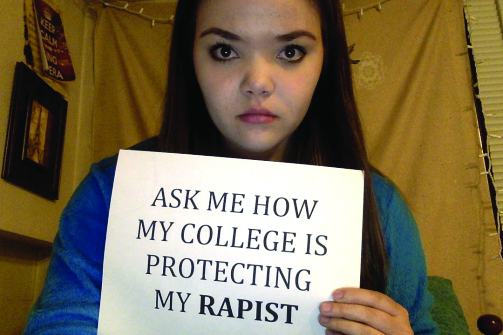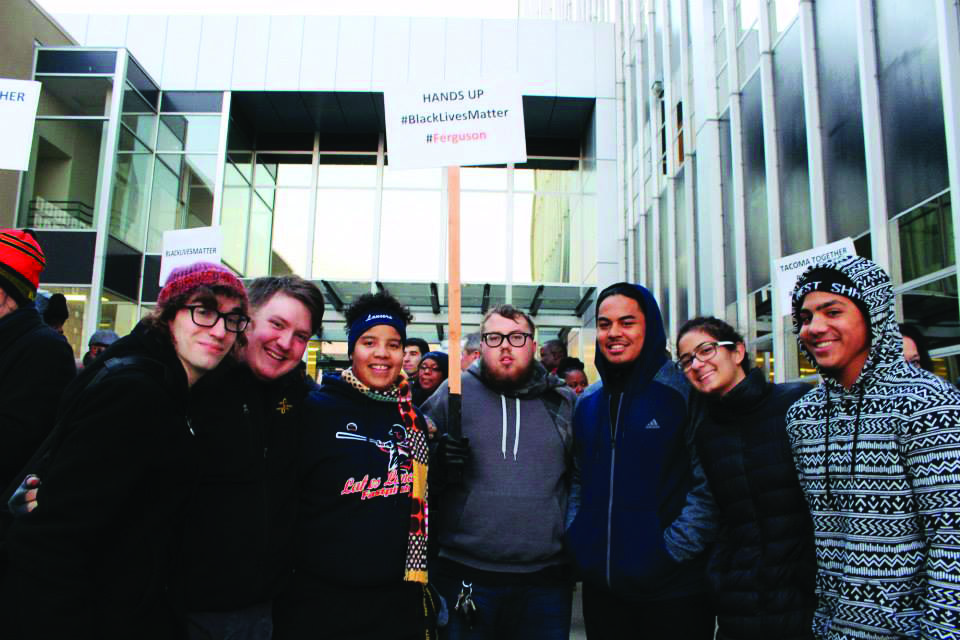SAMANTHA LUND; Editor-in-Chief, lundsr@plu.edu
CONTRIBUTED TO BY LIBBY POSTOVOIT; Copy Editor
She walks from class to class sporting a black t-shirt and pair of white shorts. Another student suddenly stops her and says, “That’s really bold of you to wear that shirt with those shorts because if you wear those shorts, you’re kind of asking for it.”
Vocal Performance major Miya Higashiyama is standing in front of Mary Baker Russell Music Center. She fashions her shirt as a new uniform and a statement. The black canvas is plain and simple with yellow text across the front reading “Ask Me How My College Is Protecting Rapists.” Just then, standing alone in the courtyard, Higashiyama knew exactly what the other student was implying – “it” was sexual assault.
“It comes with the territory,” Higashiyama said. Overnight, the junior went from opera singer to the face of a Pacific Lutheran University student-led movement against sexual assault.
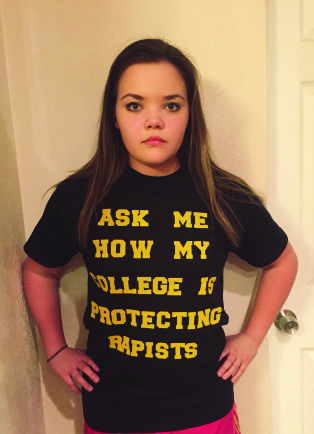
Higashiyama launched a blog about her sexual assault, the campus conduct system and other students’ experiences called “PLU is Protecting Perpetrators” earlier this month. The site details her experience with Student Conduct at Pacific Lutheran University after another student sexually assaulted her, and calls for PLU to take action.
“I’ve had tons of messages and emails from people all across campus,” Higashiyama said. “I think we hit 2000 views in less than 24-hours.”
The stories all give examples of how PLU’s Student Conduct system made them feel uncomfortable, unheard or disrespected. Higashiyama and the women she’s standing with all want to see changes in PLU’s Student Conduct system. Additionally, the campaign has now turned to looking into Title IX and Title II as well as the Clery Act to clarify that PLU is operating within the law when it comes to student assault cases.
Higashiyama claims that PLU violates each law when it comes to survivors of sexual assault. She plans to meet with PLU President Thomas Krise and Vice President of Student Life Joanna Royce-Davis to voice the group’s concerns.
Her Story
Higashiyama’s love for music inspired her to join PLU’s all-female A capella group HERmonic, it seemed like a natural fit for her. The female group and male groups on campus, sharing a love of performance and singing, naturally spent a lot of time together.
Eight weeks into her first year, Higashiyama went to an acapella party with both the female and male groups. After drinking and becoming severely intoxicated, she fell asleep on the couch. The next thing she knew, a man from the party was coaxing her into his bedroom. She says that once she was alone in the room with him, too intoxicated to consent to any sexual activity, he raped her.
“Rape and sexual assault are crimes all about power,” Higashiyama reflected. “When it happens to you, it’s like someone takes a piece of your soul.”
She struggled to understand what happened for a while. She was torn between feeling violated and ashamed. She couldn’t help but wonder if some of her friends were right in referring to it as “a hookup she regretted.” After she explained what happened to a faculty member, due to mandatory reporting, her case was brought to the attention of PLU Student Conduct.
Her Student Conduct hearing occurred two weeks later, and it was less than comfortable for the first-year student. Before and during Higashiyama’s hearing, PLU allowed the student who assaulted her to remain on campus and perform in concerts with her.
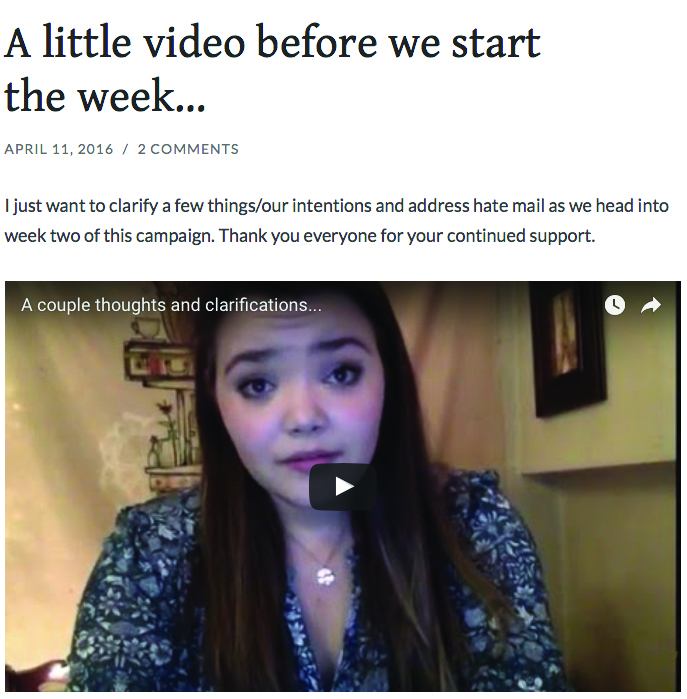
During the hearing, Higashiyama was placed on a Skype call with her perpetrator. He knew she was in a nearby room and they could see and hear each other through a screen. Higashiyama and her roommate sat in the University Center, looking into a screen, reliving the whole experience. Looking back on it, Higashiyama said she wished the conduct managers would have told her she could bring a faculty member or “support person” with her who had more experience.
Members of the panel asked her how much alcohol she consumed, what she was wearing and why she didn’t fight or scream during the assault.
To top it off, Higashiyama noticed one of the conduct leaders in her hearing was watching a football game on his iPad and drinking soda while both students told their stories.
She admittedly said she believes the panel had gathered enough information to make a fair judgment. However, the ordeal left her shaken. “By the time the hearing was over, I just wanted to crawl in a hole and never come out,” she said.
Her perpetrator was removed from campus a month later, he was suspended and given sanctions. Sanctions, which are assignments PLU gives students found guilty in a conduct hearing, range from writing essays to taking classes, according to PLU’s code of conduct. Once students complete their sanctions, they can re-apply and return come back to campus.
“Right now, sanctions for academic dishonesty are more severe than sanctions for rape and sexual assault,” Higashiyama said. “How that’s going to help someone not rape again, I don’t really know.”
Though Higashiyama feels that her perpetrator deserved harsher sanctions than he received, she is grateful PLU gave him sanctions. Other survivors of sexual assault who their perpetrators walk away from hearings without punishment, according to Higashiyama’s fellow blog contributors.
“If a perpetrator is suspended, then they’re allowed to come back,” Higashiyama said. “For example, my perpetrator has a couple minor things to complete, then he can waltz right back in. And that terrifies the crap out of me. My rapist can just walk right back on campus and resume life.”
Higashiyama’s perpetrator received a “no contact order” from Campus Safety, meaning he could not be near or talk to Higashiyama. When he tried to contact her, she said she called Campus Safety to report it but never heard anything back. She began to feel hopeless, living in fear, and decided to try and move on from the process.

It wasn’t until a few weeks ago when her music history class was watching an opera film that all of her pent-up trauma came back in full force. When a rape scene came up, she was so upset that she grabbed all of her things and stormed out of the classroom.
That night, some of her friends asked if her reaction to that scene came from a personal history with assault. When she told them her story, something unexpected happened: several friends admitted that they too were survivors of sexual assault. They shared their stories with her and it was clear to the Higashiyama that most of the survivors’ experiences with PLU’s conduct system was miserable.
“There were a lot of common themes I saw going,” Higashiyama said. “Then I started connecting the dots, it’s not just my case that wasn’t treated very well- there was a pattern going on.”
Once Higashiyama realized how prevalent the problem was – even just in one of her classes – she decided to address the larger PLU community about assault and the scarring conduct process.
From Campus Safety
“That would be very out of character for my office,” Director of Campus Safety Greg Premo said when asked about the alleged nine emails one student sent to his office that weren’t responded to.
According to Higashiyama’s blog and her own anonymous source, one student who was assaulted emailed Campus Safety nine times without a response when a perpetrator was contacting her after receiving a no-contact order through PLU. “That’s hard to imagine, but easy to look up if that student wants to come forward and we can find out what happened,” Premo said.
“Campus Safety really plays such a small role in these incidents,” Premo said, sitting in his office in lower level Harstad. Premo admits he hasn’t read the entire blog, but looked over the section regarding Title IX and the Clery Act.
Premo and his office were tied into the PLU movement when Higashiyama’s blog directly stated that Campus Safety and PLU were in violation of the Clery Act, meaning, PLU was failing to make crimes public by reporting them to the government. The Clery Act is a fluid act, Premo said, trying to explain how hard it was for someone to understand just by reading it.

There are several institutions and groups across the country that work with campus safety divisions to understand and abide by the act. Premo admits the Clery Act threw him through a loop the first time he tried to understand it as well.
The main issue that Higashiyama’s blog points out is that PLU Campus Safety is not reporting an accurate number of crimes and is not providing the public with a Crime Log that is updated at least every 60 days.
“I understand where the confusion comes from,” Premo said, continuing on to explain that the Clery Act only applies to crimes on-campus. Meaning, stories like Higashiyama’s that occurred in houses off-campus wouldn’t fall under the Clery Act even if they were reported to PLU entities.
The Crime Logs are another concern of Premo’s. Understandably, not many students request the crime logs from each month and the process to getting them isn’t as easy as Google-ing the topic. To obtain crime logs through Campus Safety, a student needs to make a request to a non-student staff member. From there, all the documents are public and will be released or shown to anyone who would like to see them.
The Crime Log is different than the Clery Act reporting. The campus Crime Log includes any incident (whether someone is found guilty or not, whether the accusation is revoked or not) that is reported to Campus Safety. That means the log is completely comprehensive of everything the Campus Safety office works on.
“I want to say about 90 percent of assaults aren’t even reported to Campus Safety,” Premo said. If nothing is filed, there’s nothing Campus Safety can do – the office is meants to be a crime reporting system.
Premo is proud of the work PLU is doing with Campus Safety, the conduct system and the Center for Gender Equity, saying the campus has come a long way in the last few years and is still looking to grow.
“We have a victim-centered process,” Premo said. “It’s meant to empower the victim because a criminal investigation can be intrusive and traumatizing. This way they don’t have to do anything they don’t choose to.”
The National Movement
Even though the movement was recently sparked at PLU, campaigns to raise awareness about sexual assault on college campuses have been popping up across the country.
In 2014, President Obama took a similar stand against college sexual assaults. Obama cited that one in five college women are raped and had one thing to say to all of them: “I have your back.” The President called for campus presidents nationwide to step up and start making changes.
Recently, the End Rape On Campus (EROC) national campaign was started as a tool for student survivors to understand their rights, become educated, get personal help and make change on their campuses. The organization’s main goal is to enforce Title XI and the Clery Act in schools as well as to educate students to know when those laws are being broken.
Following their lead, many students with similar stories to Higashiyama started other campus-wide campaigns. This March, a student at St. Olaf college launched a similar campaign and blog titled “My College is Protecting Rapists.” The St. Olaf blog and movement was the inspiration for Higashiyama’s blog for PLU students.
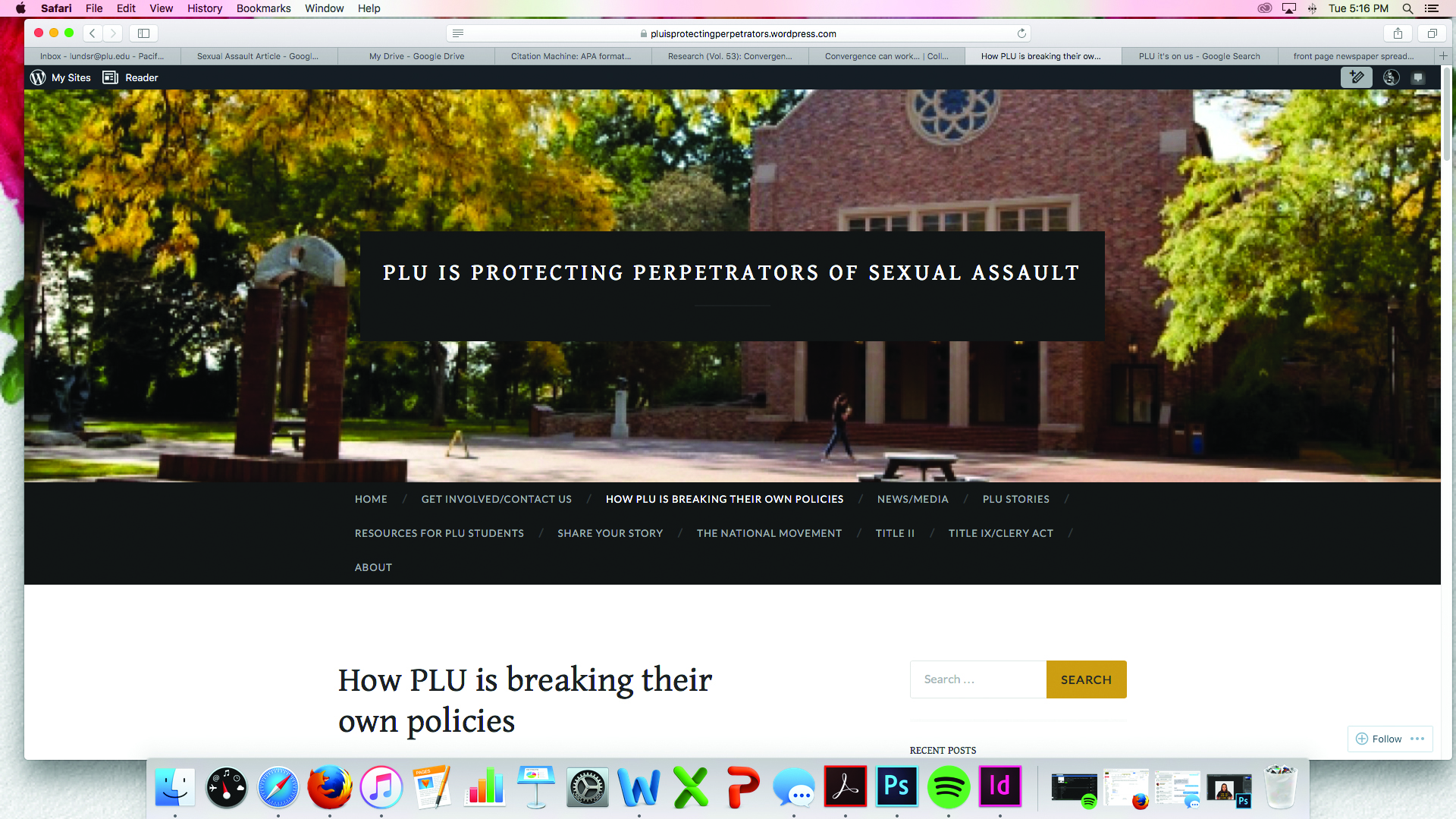
California students filed similar claims against UC Berkeley, Occidental College and the University of Southern California, according to an article published in the Los Angeles Times. Through several audits and investigations, it was found that USC and Occidental failed to report dozens of sexual assaults in their annual crime reports of 2010 and 2011. In September of 2014, Occidental managed to make monetary settlements with 10 of the women involved in the federal complaint, according to the L.A. Times.
President Obama set a precedent, stating that this kind of national movement could easily spur a governmental task force to fight such injustices across the board.
Campus Sexual Assault in Numbers
According to the National Sexual Violence Resource Center’s annual “Campus Sexual Assault Fact Sheet,” 20-25 percent of college women are sexually assaulted or raped during their time at school. Of those, 90 percent knew their perpetrator before the offence occurred.
Between 79-88 percent of victims (both male and female) are either forced into sexual activity or incapacitated as Miya had been before the assault.
Sexual assault can be anywhere on a range of sexual misconduct. In a CNN survey of more than 150,000 students from more than 27 universities, results showed that only 11 percent of sexual assaults involved penetrative or oral sex.
It’s important to note that these statistics, though they’re widely accepted, come with criticisms as well as support. Many professors and educators in this field criticize most sexual assault statistics because they either take their samples of students from too few universities, or their definition of sexual assault is too broad or too specific.
For example, the “one in five” statistic originally came from a survey that defined sexual assault as any act that is unwanted, including hugging, kissing, etc. Which, according to CNN, sparked outrage from some Oklahoma State University professors. Their arguments being that with broad terms, there will be no way to find clear-cut solutions so everything needs to be specified down to specific events and terms.

Get Involved
Several groups and organizations around PLU campus are open to students getting involved in this topic. Sexual assault reform is a prominent topic through the conduct system, Student Life, Student Rights and Responsibilities, Associated Students of PLU and the Center for Gender Equity.
A panel addressing sexual assault on campus featuring President Krise will discuss “PLU is Protecting Perpetrators” on campus next Wednesday 2-4 p.m.
To get involved in Higashiyama’s movement, students are encouraged to email her or reach out to her via social media.
“It can be really hard,” Higashiyama said. “People associate me with this now and a lot of haters are coming out.”
Higashiyama realizes the movement isn’t for everyone – getting involved at any level could come with the risk of getting in trouble or being verbally abused by others in the community.
Without the support of her family to back her, Higashiyama encourages all students going through the same thing and wanted to get involved to talk with her and the on-campus support group she’s formed from the blog.
“There’s a reason why I’m doing this. I love PLU. I want to go to a school where it’s safe, and I want to go to a school where sexual assault and rape are taken seriously, and where victims feel they can be safe on campus,” she said “He has a couple minor things to complete, then he can waltz right back in. And that terrifies the crap out of me. My rapist can just walk right back on campus and resume life.”

















